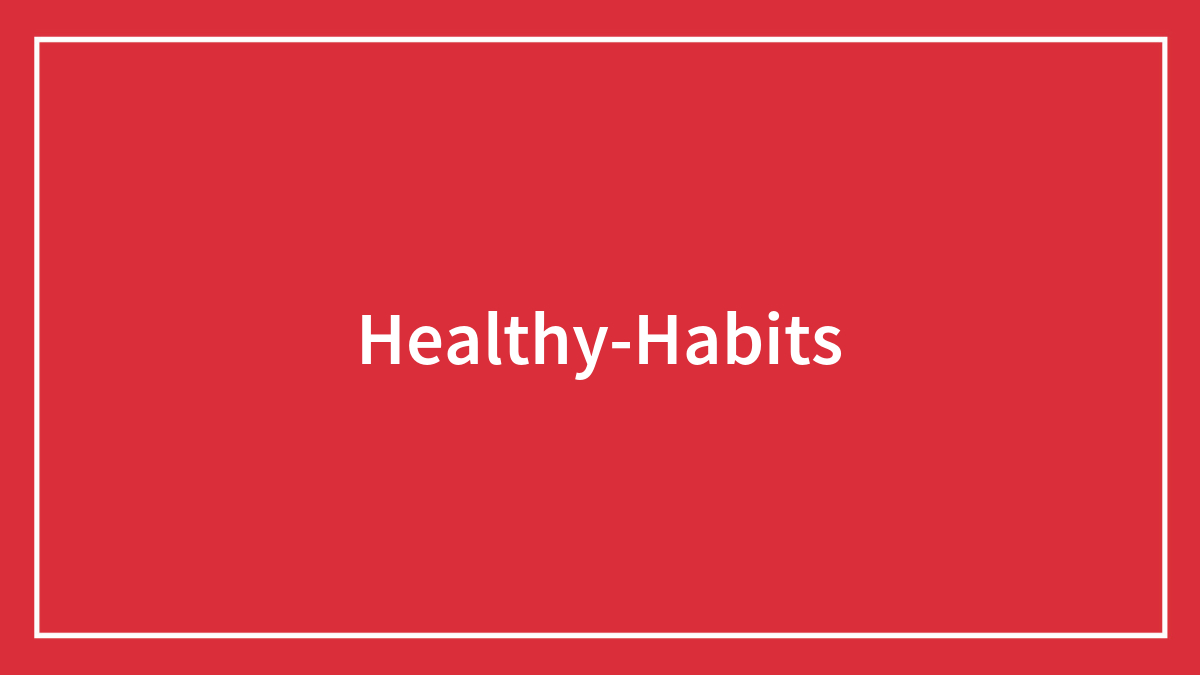Healthy looks different on everybody. Yet, health, just like happiness, looks good on anyone. Our current health status is very much a build-up or a follow-up of our many unhealthy or healthy daily habits. Everyday practices, whether good sleep habits or poor hygiene, reflect on our physical and mental health. If truth be told, very few can boast about having immaculate health. And while certain health-related issues, such as acute illnesses, appear rapidly, many chronic diseases and often mental health problems stem from unhealthy lifestyles and bad habits.
To avoid being a regular at the doctor's in the future or improve your current health, it’s never too late to establish good daily habits. While healthy eating habits are essential, not all good habits revolve around the food we consume. Among the many healthy habits to start are simple things such as maintaining a consistent sleeping schedule, increasing physical activity, or even putting on a smile even when you don't feel like it. However, starting something new is never easy, and one must prepare for the obstacles that come with it.
One of which is that the many health tips and fitness tips available online are full of potholes. Due to the abundance of so-called health whizzes, mental coaches, and wannabe fitness experts, sorting through an avalanche of information, both useful and hogwash, can take a lot of time and effort. Thus, establishing healthy habits or healthy morning routines may seem like plenty of elbow grease to sort through. However, what if someone else did the entire job and researched the information for you? Well, we already did, so you're welcome.
Below, we've researched all over the internet to bring you reliable information to support your journey to a healthier lifestyle. While many good habits to have don't require science-based evidence as they are common everyday things we often forget about, check out the sources we've listed under the entries if you have doubts about believing everything you read on the internet (as you should!) Also, let us know, do you have a healthy habit that significantly improved your life? Are you looking to catch a healthy habit anytime soon? Perhaps in 2023? Share your thoughts in the comments!
This post may include affiliate links.
Spend time with your pet.
Animals can contribute in subtle yet substantial ways to one's overall well-being. They make you feel less lonely, motivate you to go out and stay active, forge warm relationships, keep you present and give you a sense of direction. Numerous studies revealed the advantages of having a furry roommate. In fact, spending time with dogs has been shown to lower blood pressure, lower triglyceride and cholesterol levels and boost the release of dopamine, hormones linked to pleasure, thus simultaneously easing stress levels.
Cook your own meals from scratch.
Making your own food from scratch is another habit that healthy people frequently practice. Doing so may ensure that artificial substances are kept to a minimum. Preparing your own meals also allows you to control portion sizes, save paying for takeout, and improve your cooking skills.
Drink plenty of water.
The importance of staying hydrated can't be stressed enough. While drinking water can benefit you in many ways, it's really about staying hydrated. One may think that drinking loads of coffee and soft drinks will do the job, after all, all drinks contain water, right? However, excessive use of caffeinated beverages, such as coffee and soft drinks, which people often substitute for water, actually does the opposite and causes the body to lose even more water. So no, liquids are not equal. According to an article published in Nutrition Reviews, drinking water also promotes regular blood volume, viscosity, and circulation, which are essential for the healthy operation of all the body's organs and tissues. Another argument in favor of water? Obesity and type 2 diabetes have been related to sugary beverages.
Fix your posture.
Have your parents ever shouted at you for having poor posture when you were younger? While there are better ways to communicate to a kid to sit correctly, the unfortunate thing is that they were right. Proper posture will help you avoid aches and strain on your ligaments, muscle soreness, weariness, and backaches.
Oh also it may prevent this horrible real thing called buffalo hump..
Make sure you chew your food well.
Most people gorge on their meals without taking the time to chew or truly enjoy them. If you fall into this category, try to eat more slowly by chewing every bite for longer. In fact, some studies revealed that most food should be chewed about 32 times! While counting one's jaw movements may not be very rational or practical, you should take your time with eating. While cleaning your house may be something you rush through, eating your lunch shouldn't. Other than that, it's likely that while you are chewing, your brain will receive a signal from your belly that "that's enough food for now, thanks," suggesting that it's time to get up from the table. This little trick may help with overeating, so practice mindful eating, folks!
Limit sugary drinks and swap them for water.
The primary source of added sugar in the American diet is sugary drinks, such as soda, fruit juices, and sweetened teas. Unfortunately, studies indicate that even in people who do not have excess body fat, drinking sugar-sweetened beverages increases the risk of type 2 diabetes and heart disease. Healthier alternatives include water, unsweetened teas, sparkling water, coffee, and don’t forget freshly squeezed juice!
Cut down on processed foods.
Highly processed foods contain ingredients that are significantly modified from their original form. They frequently have additional ingredients, such as sugar, salt, highly refined oil, artificial sweeteners, colors, and flavors. In addition to low-quality ingredients such as refined grains, inflammatory fats, and added sugar, highly processed foods usually lack fiber, protein, and micronutrients. Ultimately, they provide empty calories and low nutritional value.
Train your muscles.
Strength and resistance training are the best exercises to build muscles and enhance body composition. Additionally, it may lead to considerable improvement in metabolic health, including an increase in metabolic rate - the number of calories you burn when at rest - and enhanced insulin sensitivity, which makes controlling blood sugar levels easier. If you don't have weights, you may still get a similar workout and many of the same advantages by using resistance bands or your body weight. Physical Activity Guidelines for Americans advise resistance training to be done at least twice weekly.
Floss! Brushing your teeth isn't enough.
How many people actually take the time and floss their teeth after a long day? According to some research, regular flossing could extend your life by more than 6 years. Why? According to one theory, the bacteria that create tooth plaque reach the bloodstream and are linked to the inflammation that narrows blood vessels and results in heart disease. Another study found that individuals who flossed once or more per week had a 17% lower risk of developing gum disease than those who did not. Thus, create the habit of flossing your teeth thoroughly before hitting the hay to possibly lengthen your lifespan!
Find something to laugh about.
Numerous studies have confirmed the psychological and physical benefits of laughter, such as improved mood, boosted immunity, better heart health, and even longer lifespan. Although the perfect sort of laugh is shared, just laughing to (or at) yourself or while watching a hilarious TV show can be just as effective.
Make time to read every day.
Reading is not only a self-care practice, but it can also enhance long-term brain health. Your body and mind will appreciate it, whether you're an avid reader of fiction or memoirs or just want to lose yourself in a good, ol'-fashioned romance novel. In fact, one study discovered that yoga and humor weren't the only ways to reduce stress — 30 minutes of reading also had those same effects. Reading also lowered blood pressure, heart rate, and psychological discomfort.
Learn something new.
Developing new skills promotes brain health. Enroll in a dance class or a session for creative writing. Start learning a new language. The mental effort required can lessen the consequences of Alzheimer's disease and slow the aging process.
Aim for 8,200 steps a day.
Sounds like a lot? In reality, it’s not as much as you think. You might have heard a bajillion times that people must aim for 10,000 steps a day. However, this is now seen as more of a marketing gimmick than anything else. In fact, the newest research shows that just 8,200 steps may be just as beneficial and help you avoid many chronic diseases and maintain a healthy weight.
Prepare your snacks in advance too.
Preparing your snacks is a good habit to develop in addition to planning your meals in advance. In this way, you can ensure that you always have a variety of yummy and healthy snacks available for you to enjoy without getting off track with your healthy lifestyle!
Use sunscreen daily.
Prevention of cancer and sun damage should not be taken lightly. Using sunscreen daily is essential for both short- and long-term health, whether it's a sunny day or not. With so many fantastic sunscreen options, it's easy to pick the one that suits your skin type.
Ride your bike to the store.
Delivering some mail? Do you need to pick up some ingredients for your chicken casserole? Instead of driving, get on your bike and do some simple cardio. Bike riding for even 30 minutes might help you develop endurance and strengthen your heart. Additionally, it's a fantastic opportunity to relax and enjoy the outdoors. Just be sure to wear a helmet at all times!
This may work for some people, even most people, but my nearest grocery store is 20 minutes away by car. Those of us in rural areas can't really follow this one.
Head outdoors.
Spending time outside increases vitamin D levels, which is required for your bones, heart health, and better mood. Additionally, being outside increases your likelihood of moving your body rather than keeping it parked in front of the TV or computer. Moreover, if you can, choose the outdoors over the city streets. According to one study, those who strolled through urban green spaces were less agitated than those who did so through densely populated regions. Consider starting a new hobby or outdoor activity like hiking, jogging, gardening, paddle boarding, or just going for a walk.
Keep your balance.
If you're young and active, having good balance will help you stay injury-free. If you're older, it will keep you active for longer and reduce your risk of falling and breaking a bone. No matter your age, good balance results in higher muscle tone, a healthier heart, and more self-assurance. Yoga and tai chi are excellent exercises for it. Still, anything that keeps you moving, even walking, can help.
Challenge yourself.
Find your inner Van Gogh by taking painting courses, or perhaps consider picking up a second language. In fact, a Swedish study found that learning a foreign language has a visible impact on the brain. Thus, by learning another lingo, you are growing your brain, literally. When considering taking a language course, most envision a classroom full of wobbly desks, chalkboard dust, and a three- or four-digit tuition price. However, many online websites and apps nowadays let you learn languages for free. Consider checking out Duolingo, Open Culture, Livemocha, or Babbel!
Be consistent.
When applying any changes to one's routine, whether nutrition or workout-related, it's essential to evaluate how sustainable they are in the long run. Ultimately, it's the established habits and consistency which bring the results. Being consistent helps create momentum and success when accomplishing any kind of goal, whether related to fitness, skills, or a career. Additionally, maintaining consistency may help you gain confidence in yourself and hold yourself accountable so you can monitor your development and adjust your behavior as needed.
Stretch before bed.
With a few easy stretches before bed, you may sleep better, enhance blood flow, and reduce muscle tightness. Stretching, according to research, may improve mood and cognitive function, making people feel more at ease and task-focused. Stretching benefits everyone, even those with minimal levels of physical activity. Other than that, studies also showed that completing particular stretches may aid with headache relief and the improvement of poor sleep, which can sometimes worsen headaches.
Take your time eating.
It is your brain, not your stomach, that controls how hungry or full you feel. By taking your time and eating more slowly, you give your brain enough time to tell your stomach that you're full and for your food to be thoroughly ingested. You shouldn't rely on a clean plate to indicate when to stop eating.
Take an exercise break.
Get up and move about instead of just getting another cup of coffee! Or, make a compromise and do lunges on your way to the break room. After sitting at your desktop for a while, stand up and do some easy stretches. It benefits both the body and the mind. Also, no need to go for hours-long walks. The recommended 150 minutes of weekly exercise can be met with a brisk 10-minute stroll each day. Simply walking has many health advantages. Just 30 minutes of walking each day might be enough to combat the blues!
Don't smoke.
In the age of "modern smoking," e-cigarettes, and vaping, inhaling flavored air might seem like no biggie. It is indeed a biggie. While the harm caused by vaping may be less than that of traditional cigarettes, the product hasn't been on the market long enough to fully understand its consequences. Either way, nicotine is harmful and addictive, and quitting it might be a significant step toward improved health as your body can heal itself and the damage inflicted reasonably quickly. Break the bad habit now.
Freeze your fruits and veggies.
This is an excellent idea because it ensures that your fruits and veggies stay fresh until you’re ready to consume them. Well, not fresh in the freshest sense, but you get the idea. You can freeze your greens when they’re at their “best,” aka ripest, ensuring they’ll taste delicious whether cooked or reheated. This method is a great way to consume nutritious fruits and vegetables outside their peak season.
Buy a reusable water bottle to take with you everywhere.
If you have a reusable water bottle with you, you won’t have to search for a store or vending machine and pay every time you get thirsty. Also, a soda can may look very appealing, and you may be unable to resist the temptation. Furthermore, reusable water bottle owners are likely to drink more fluids throughout the day!
Avoid over-exercising.
Equal to the importance of working out is the importance of knowing when to rest. The dark side of the fitness industry that few talk about is that some turn it into an obsession in which taking a rest day equals laziness. This can’t be further from the truth. Rest is necessary. Moderate physical activity for 30 minutes is sufficient to reduce your risk of developing diabetes, high cholesterol, and high blood pressure. Exercise buffs frequently believe that a two-hour run will increase their health by four times. That is not how it operates. Overindulging in exercise can result in injuries, weariness, and depression. On some occasions, certain physical injuries may last a lifetime. As with everything in life, balance is key.
Especially important when you have fibromyalgia. Overdoing it can be just as bad as not exercising and it's a fine line that you have to learn
Do things by yourself.
Will you only start exercising once you find a gym buddy? Do you find it intimidating to eat at a restaurant by yourself? Never considered going to a movie theatre on your own? People who lack self-worth or self-esteem may feel like they can't do something by themselves. If you think of it, practically, there are not many things you can't do alone. Sure, some activities are more fun with company, yet they don't require it. The need to always be doing something with someone can lead to a lack of self-love and a sense of neediness. Rome wasn't built in a day, nor will confidence be. You build self-confidence and independence by accomplishing and doing things on your own. Make time for yourself, and don't fear some alone time.
I only read "Do things by yourself" and "don't fear some alone time". I HAVE NO FEAR, SIR!
Look after your gut.
A healthy gut and digestive system help to keep viruses, bacteria, and fungi at bay. Thus, gut microbiota, also known as gut bacteria, is essential for overall health. Obesity and various digestive problems have been linked to a change in gut flora, a common factor in many chronic diseases. Consuming probiotic-rich foods like yogurt, kefir, and some types of cheese, supplementing with probiotics when needed, and getting lots of fiber are all practical approaches to promote gut health. For example, fiber serves as a prebiotic or food source for the bacteria in your gut.
Swap sugary desserts for fresh fruit.
Life is hard. Sometimes you just need that cookie or a piece of cake to soften it a tad. Go for it! But if you're used to having sweet goodies as your dessert, it might be time to switch things up by adding some fresh fruit. Without the excess sugar, you still receive that refreshing blast of sweetness we all need after a savory meal.
Swap your coffee for green tea.
We, too, can't get enough of coffee. However, occasionally switching to green tea can have many health advantages while still giving you that much-needed caffeine spike. It can aid in reducing inflammation, contains anti-cancer antioxidants, encourages fat burning, and more.
Practice positive self-talk.
The inner conversation we have with ourselves is described as self-talk. Unfortunately, we often underestimate the power of our internal dialogue on how we perceive ourselves and the world. As you might have suspected, positive self-talk is the opposite of negative self-talk. It's not about being narcissistic or tricking our minds into making false assumptions. It's more important to have compassion for oneself and to comprehend who you are and what you've been through. Some examples of positive self-talk include: "I deserve to be happy," "I'm beautiful the way I am," "I am doing well," "I can do it," "I'm good enough," or "I'm allowed to make mistakes."
According to one study, self-talk may have even impacted how people handled their anxiety during the COVID-19 pandemic. Findings showed that individuals who admitted to using positive self-talk had lower levels of worry about dying and less obsessive-compulsive behavior. The study also discovered that those who used constructive self-talk created practical coping mechanisms for handling their feelings and stress.
Don’t skip breakfast.
Many underestimate the importance of a good nourishing breakfast. As the name implies, breakfast breaks the overnight fast. The first meal of the day supplies crucial nutrients needed for optimal health. It replenishes your glucose supply to increase the energy and alertness required throughout the day. Other than that, eating in the morning speeds up your metabolism and prevents later overeating. However, if a large breakfast plate or a bowl of oats isn’t your thing, keep it light with a granola bar, a smoothie, or a fruit.
Start meal prepping.
While initially, meal prepping may seem like a hassle, in the long term, it will enable you to save time and money. Set aside time, then take a seat and consider your requirements and aspirations. Do you want to cut out trans fat for better heart health? Consume less sugar? Stop eating TV dinners? Or perhaps you want to add more vitamins or protein to your diet? Meal preparation puts you in charge. You are responsible for the contents and the nutritional value of your plate. Psst, by bringing your own lunch box, it'll be much easier to avoid the donuts in the office break room. But hey, one donut ain't hurt nobody!
Find delicious substitutions for unhealthy foods.
Avoid purchasing foods and snacks high in calories but poor in nutritional value. You don't have to cut them out altogether, but try to eat them less frequently as a treat instead. Try swapping high-fat or sugary choices for healthier alternatives, such as low-fat dairy, whole grains, healthy oils like avocado and olive oil, and fruit.
Don’t eat until you are full.
It's a common (thankfully, now busted) myth that the more food you consume, the more your stomach expands. In fact, although people can range in weight, most adults have stomachs around the same size. Think of it as a balloon — as you eat and drink, it expands, and when your food is fully digested, it shrinks back to its original size. Your stomach and brain regulate your appetite and feeling of satiety in several ways, so listening to their signals is essential. As the stomach fills up with food or liquid, stretch receptors in the stomach become active. These receptors deliver a direct call to the brain via the vagus nerve to tell you, "hey, it's time to slow down" or "we full, thanks." In brief, according to this theory, people who eat too fast may not allow this complex hormonal cross-talk mechanism enough time to operate; thus, the satiety signals reach the brain a few (or too many) bites too late. This, again, stems back to the importance of taking time to chew your food.
Apparently it takes roughly 20 minutes before the "time to stop" signal gets to your brain. Hence, slow down :)
Choose an enjoyable exercise.
You might neglect working out because you feel intimidated going to the gym or running outside in the cold seems off-putting. The only solution is to find an exercise you genuinely enjoy and feel comfortable doing. You’ll be more driven to work out regularly and turn it into a habit. If you find it difficult to pick, try exercises that include playing with a team or with friends, such as football, basketball, or volleyball. Either can be played both outside and inside. Also, if it helps you mentally, you can treat it as a game rather than exercise!
Minimize your screen time.
As digital transformation propels us into the future, ICT gadgets like smartphones, laptops, tablets, and PCs are becoming increasingly important in our daily lives. People are becoming increasingly dependent on screens and addicted to the internet. Excessive screen time may result in eye pain, stiffness in the shoulders and neck, lack of sleep, higher insulin levels, and fat accumulation in the blood. Limiting screen time may improve your physical as well as mental health and provide you more time to practice your new healthy habits.
Eat a rainbow of foods.
Instead of calculating calories and restricting yourself, eating a rainbow of foods is one of the healthiest habits you can develop. In fact, it is believed that the phytochemicals that give fruits and vegetables their vivid colors are beneficial. This is so that your body can better defend itself against disease thanks to the antioxidants they contain.
Lycopene, anthocyanins, ellagic acid, and astaxanthin are antioxidants found in red foods, including tomatoes, berries, and red-colored seafood. Carotenoids, including alpha- and beta-carotene, are found in orange foods, including orange peppers, sweet potatoes, pumpkin, mangoes, and nectarines. Antioxidants like chlorophyll, lutein, and zeaxanthin can be found in green vegetables, including cabbage, kale, and Brussels sprouts. Additionally, foods with a blue or purple hue, such as red cabbage, beets, and blackberries, also contain anthocyanins. These antioxidants have all been researched and shown to be good for health.
Differentiate between cravings and hunger.
People often confuse cravings for food with actual hunger, which can result in excessive nibbling throughout the day. Understanding when we are truly hungry versus simply seeking something to nibble on is an excellent habit to establish. Yet, it's not an easy one. Often, your body will let you know when it's hungry. A growling stomach and dizziness are your body's way of alerting you to the fact that you need food. However, these physical signs usually appear when one is starving, and you shouldn't wait until you reach a high hunger level to allow yourself to eat. When it’s time to eat, you might experience milder symptoms like thinking about food, gurgling or rumbling in your stomach, lack of focus, or poor energy. On the other hand, a craving is more focused on a particular flavor, texture, or cuisine. You might crave a specific sweet or salty meal, usually the so-called "comfort" foods, such as chocolate, sweets, or fast food.
Incorporate strength training into your program.
Strength and resistance training are the best types of exercise to build your muscles and enhance your body composition. Additionally, it may lead to considerable improvement in metabolic health, including an increase in metabolic rate - the number of calories you burn when at rest - and enhanced insulin sensitivity, which makes controlling blood sugar levels easier. If you don't have weights, you may still get a similar workout and many of the same advantages by using resistance bands or your body weight. Physical Activity Guidelines for Americans advise resistance training to be done twice weekly.
Drink water before anything else.
Drink a glass of water first, then begin sipping your morning brew. In addition to being refreshing, it can also assist the body stay hydrated while promoting digestion and metabolism.
Sit properly.
It's crucial to sit with good posture as part of your everyday routine. Sit up straight and point your back curve as much as you can. Then slightly relax your shoulders. You can observe the outcomes on your own if you continue this exercise.
Pay attention to your health.
A generation ago, people would only go to the doctor if they were very ill or on the verge of death. Thankfully, more people are receiving preventative healthcare as they become more informed and take ownership of their health. Thus, to ensure that your health is in good shape, schedule regular checkups and take your medications as appointed by the doctor.
Do a shower meditation.
Get in the shower first, then let the warm water wash over your entire body. Second, picture all of the tension, worry, and anxiety surrounding you. Third, imagine those being scrubbed away with water and soap. Fourth, visualize all your bad emotions draining away. Finally, realize that you are free and clean.
Have healthy snacks on hand.
Your metabolism will benefit from frequent short meals and snacks. Yet, it is still essential to keep them nibbles healthy. When choosing snacks to eat throughout the day, look for products such as fruit, salad, nuts, or freshly squeezed juices that are not from concentrate.
Stock up on healthy snacks.
When you are hungry, like ravenous, you will munch on anything you find in your refrigerator, freezer, and cabinets. You'll likely find yourself munching on ultra-processed foods like fries, pot noodles, sugary cereals, chocolate, and potato chips if that's all you have in there. To punch this unhealthy habit in the throat, ensure you have plenty of nutritious snacks, such as dried fruits, seeds, and nuts you can snack on while prepping yourself a delicious homemade meal.
Take a walk at lunchtime.
There’s more to lunchtime than just eating. You can benefit from light, air, and movement once you are done eating or while waiting for your Uber Eats to arrive. Ideally, you would spend half of your lunch break eating and the rest doing something more active. P.S. Chitchatting with a coworker while making circles around the office counts.
Choose healthy fats.
Just like not all carbs are created equally, the same goes for fats. While we should avoid categorizing food into ‘good’ and ‘bad’ categories, some fats benefit us, and some don’t. So what are the ‘good’ fats? Those are unsaturated or monounsaturated and polyunsaturated fats. Products like vegetable oils such as olive oil, nuts, seeds, and fish have them. In fact, extra virgin olive oil is the least processed sort of olive oil and is frequently considered the healthiest. It has a lot of monounsaturated fats, which are good for the heart, as well as potent antioxidants and anti-inflammatory compounds. According to some studies, extra virgin olive oil may benefit the heart because those who use it have a lower chance of passing from heart attacks and strokes.
Medidate.
According to studies, daily meditation helps reduce stress, anxiety, and numerous health problems, such as high blood pressure, a condition nearly half of adults in the United States suffer from. Studies have also proved that meditation may improve focus, memory, mood, and emotional control.
As someone with severe ADHD (among a number of other things), this is SO hard for me. Anyone in a similar boat have any tips? I've read and listened to countless books, uses lots of apps and I just can't seem to turn my brain off.
Have a cup of green tea with your breakfast.
Having a cup of green tea with breakfast is another healthy morning routine to adopt. Green tea, in its purest form, has a wide range of health advantages for both the mind and body. It has a significant amount of healthful compounds called polyphenols and catechin, also known as EGCG. The latter is supposed to deliver the medical benefits of green tea, some of which are lowering inflammation and avoiding certain chronic conditions. According to research, green tea may also enhance brain function, promote fat burning, lessen foul breath, and aid in weight loss.
Wake up early.
By getting a head start on the day, you may commit more to your set targets and have more time for a productive routine. This can be one of the previously listed daily routines of successful individuals, such as going to the gym, meditating every day, or eating a thoughtful breakfast. Moreover, according to a study, people who get up early are likely to have greater levels of positive affect and mental health.
Make time for self-care.
Self-care is necessary for your health, whether it's a bubble bath, a cup of hot chocolate, taking a few slow breaths, or scheduling a deep tissue massage. You owe it to yourself and your health to prioritize and love yourself. Routinely dedicate at least one day in a month to reflect on your life and focus on personal rediscovery, health, and healing. Spending the day pampering yourself will help reduce stress, soothe your body, and refresh your mind. You can pamper yourself for as little as five minutes each day, but let's face it, the more, the merrier.
Reduce or eliminate alcohol consumption.
In regards to alcohol, cutting back is nearly always a bright idea. Whether your goal is to reevaluate your relationship with alcohol, find support to quit or try to drink more thoughtfully, reduced alcohol use can improve sleep, mental clarity, weight loss, and reduce the risk of cancer, strokes, heart disease, and liver disease.
Make your bed every morning.
The quickest approach to rapidly improve the appearance of your entire bedroom is to quickly fluff the pillows and tug on the sheets and blanket. But some unexpected advantages to making your bed every day go beyond that. William H. McRaven, retired Navy four-star admiral, even wrote a book wittily called "Make Your Bed: Little Things That Can Change Your Life... And Maybe the World" about the key mental health benefits of this ritual.
According to the author, making your bed in the morning preps you for success. According to his thesis, you can accomplish at least one goal in a day just by making your bed. So you can start your morning with a tiny triumph by simply straightening up your covers, which, in theory, will inspire many more throughout the day. Making your bed may also provide additional mental health advantages, such as improved sleep, reduced stress, a calmer and more positive outlook, and improved mental organization.
What about "You made your bed, now lie in it"? I can't do that every day, I have work to do people
Do dishes right after eating.
You could definitely be doing better things in the evening other than washing all your dirty dishes piled up in the sink from the entire day's worth of meals. It will be much quicker and beneficial for you to do the dishes after every meal instead. Moreover, if dishes and utensils are not thoroughly washed, rinsed, and dried, bacteria may grow on them. And as if the previous reasoning wasn't enough, dirty dishes, utensils, and food scraps left around the kitchen can attract pests like mice and cockroaches. *grabs a sponge*
Wake up at the same time every day.
We all enjoy sleeping in on the weekends. But for proper sleep hygiene, it's imperative to wake up at the same time each day. Have you ever wondered why Mondays are such a struggle to get out of bed? You may be having problems getting back on track since you've disrupted your schedule for two days in a row. Thus, try to maintain a consistent sleeping and waking pattern, even on the weekends. For one's physical and mental health, adults need between seven and nine hours of sleep each night.
Take vitamins.
Many people don't get all the vitamins and minerals the body needs from their daily diet. Consider including vitamins to support your diet as part of your everyday routine. A multivitamin may be adequate for some people. Others require extra supplements, such as iron, if they have an iron deficiency or vitamin D. When in doubt, always discuss any potential needs for supporting your health with your doctor.
You are wasting your money buying vitamins if you aren't actually deficient in them though. Plus multivitamins often don't have high enough amounts of each vitamin if you are deficient. Get blood tests and consult your doctor before spending the money.
Scale is just one of many tools to measure your weight.
If your goal is to lose or gain weight, you can track the changes by monitoring your body weight on a scale. However, there are plenty more ways to measure success than just stepping on a scale. Trying on old clothes and progress pictures do wonders! Regardless of what the scale says, if you've been exercising, eating accordingly, and sleeping properly, you'll notice a difference. Exercise may seem simpler, and you'll probably feel more energized throughout the day. You can also determine fluctuations in your weight by looking at old images and giving yourself a quick once-over in the mirror.
Walk.
Numerous studies have listed the improvements that exercise as simple as walking can make. Longer lifespan, reduced high blood pressure, lower risk for type 2 diabetes, healthy body weight, and a strong musculoskeletal system are just a few benefits of walking. If you're at work, go to the farthest bathroom and always use the stairs. While running errands, park as far away from your destination as possible, then walk from there. Just keep in mind that every step counts, no matter how big or tiny.
Watch your carbs but don’t avoid them.
The idea that carbohydrates cause weight gain is the biggest fallacy of all time. Carbs don’t cause weight gain; consuming too many calories does. While technically, there are no ‘good’ or ‘bad’ carbs, not all carbohydrates are created equal. Due to extensive processing, refined carbohydrates often lack fiber. Eating too many processed carbs can be harmful because they contain few nutrients. The primary components of the bulk of ultra-processed foods are refined carbohydrates, such as processed corn, white flour, and added sugars. According to studies, eating a lot of refined carbohydrates may increase your risk of developing conditions such as type 2 diabetes and heart disease, as well as binge eating and weight gain.
Do something nice for someone.
Being happy is arguably the ultimate goal in everyone's lives. Interestingly, while very subjective, happiness often comes from trying to make others feel happy and good about themselves. That's not just empty words — there's an entire study dedicated to the topic. Whether to secure a spot in heaven, gain extra karma points, get Lady Fortune on your side, or for no motive other than simply being kind, there are plenty of ideas for random acts of kindness to fulfill in everyday life.
Express gratitude.
Multiple studies have associated gratitude with a more positive outlook, happiness, lower stress levels, and thus better health. Even if most of what happened throughout the day was pleasant, people frequently focus only on what went wrong in their day. An excellent habit to develop is to reflect on your day and list all the beautiful things that happened. Among the many things to be thankful for can be a smooth commute to work, a delicious meal, a stranger's smile, or a message from a friend. Even when you think your life sucks, there are many things to be grateful for. Never forget that.
Write things down.
Because the brain processes information more slowly while writing, writing things down can have a significant therapeutic effect and help memorize what's being written. It can also help process your feelings and limit thoughts that persistent overthinking aggravates. This is why many opt to keep a diary, as writing can help organize thoughts and aids self-reflection. Other examples include making a list of one's victories and achievements or writing down goals and aspirations that can boost positivity and encouragement.
Smile (even if it's fake.)
Genuine smiles convey inner joy. However, even a fake smile can fool the brain into believing we're content. In a recent study, researchers discovered that smiling, even a forced smile, can improve happiness. In essence, smiling can "trick" your brain into thinking you're happy by activating certain facial muscles. So grin even if you're by yourself. You'll notice that over time it develops a feeling of mental well-being.
Choose three goals to prioritize daily.
Our to-do lists are often lengthy, and we frequently feel unaccomplished at the end of the day because we never manage to finish them. If that rings a bell to you, try changing your perspective by concentrating only on three of those tasks each day. It's more than enough. Anything over those three is a bonus win!
Create a morning ritual that gets you fired up for the day.
Perhaps you enjoy running. Maybe you like to meditate or have a nutritious breakfast. Whatever it may be, start your day with the habit that gives you the most energy. Setting up a purposeful morning routine aids in giving your day a proactive, upbeat start. Instead of hurrying to make up for missed time, having a scheduled morning routine increases productivity by reducing stress and mental exhaustion.
Do cardio exercise in the morning.
Cardio is one of the best types of exercise for your physical and mental health. It is especially effective at shedding belly fat, the unhealthy fat that accumulates around your organs, and may significantly enhance your metabolic health. Cardiovascular exercises done in the morning may lower heightened cholesterol levels and burn additional fat. A morning stroll and exercise can boost your energy, support your immune system, and enhance performance. In fact, exercising in the morning increases metabolism more than at other times of the day.
Go offline.
Do you frequently check your email and social media? You can easily get the most recent updates from your friends and relatives, but do you really need to see photos of your cousin's most recent meal? Decide on a time when you'll log off and put the phone away. Reducing your screen time gives you more time to engage in other activities. Instead, go for a walk, read a book, or assist your cousin in chopping vegetables for their upcoming delicious meal.
Cut down on your meat intake.
While meat isn't deemed the healthiest food of choice, there's no substantial health-related reason to cut it from the diet entirely. Health-wise, meat is a good source of protein, essential minerals, and vitamins. Yet some meats, such as processed or red, aren't particularly nourishing. Thus, opting for a few meat-free days throughout the month may benefit your health. If you're a big meat eater, try eating no meat on a specified day of the week, which will instantly cut back on your meat consumption. Also, it will introduce you to the mouthwatering flavors offered by the vegetarian and vegan kitchens. And if you think vegan meals are not delicious, you have tried the wrong ones! P.S. Broccoli, while vegan, is not considered a dish.
Detox digitally.
While "skinny" detox teas might be futile, a digital detox is something many can greatly benefit from. Unless you are a journalist, there's no need to constantly stay up to date with the newest information. In fact, a recent study found that people who continually check the news are more prone to experience physical illness, stress, and anxiety. However, "news addiction" isn't the only harmful habit endorsed by staying online. Numerous studies also found that excessive social media use directly correlates with worsening mental health conditions. By often checking social media and comparing your life to others, one can feel defeated, unsuccessful, and like they are not doing as well as others. While it's important to keep up with current affairs and stay in touch with people, the time spent online should be limited, and more time should be spent living in the present.
Switch up your routine.
Although routine might keep us at ease, it also breeds a sense of doldrums and can lead to despair. Simple everyday adjustments can fool the brain into thinking you're doing something entirely different. It can involve taking a different route to work, walking rather than taking the bus, eating lunch somewhere new, or waking a little earlier each morning. Changing things around brings variety and exposes you to new opportunities and experiences.
Consider a more positive perspective.
A pessimistic outlook leads to negative living. If you always see the glass as half empty, consider why you think this way. It might just result from beliefs you've acquired, but remember that you can always choose how you interpret events. Is everything really that bad? If you can think of ways things can get even worse, you are not doing too bad, huh?
Go to bed 30 minutes earlier than usual.
It's all too simple to end up viewing one more video in the era of Netflix and YouTube. You would have likely gone to bed two to three hours sooner than you do now if there was no internet. Our recommendation: you have an alarm clock that goes off in the morning. Why not set the alarm to let you know when it's time to stop watching TV and go to bed?
Focus on nutritional value, not calories.
Too many, and let us stress this, TOO MANY people base their diet around the calories they consume rather than the nutritional value of their meals. However, a good diet is more than just the number of calories. Sure, one can eat just a bag of potato chips, which will fit in their daily macros; however, that’s not a nutritionally balanced diet, and one would likely be ravenous for the rest of the day and risk overeating later.
Reduce your sugar consumption.
Today, sugar, also referred to as a 'white poison,' or 'the white death,' is a frequent component of pretty much any meal and beverage. Obesity, type 2 diabetes, and heart disease are all associated with a high sugar intake. The Dietary Guidelines for Americans advise limiting added sugars to less than 10% of daily calories, whereas the Dietary Guidelines for Americans advise keeping added sugar intake below 5%.
Stop taking photos of everything.
Even though taking photos for mementos is wonderful, spending too much time shooting images rather than enjoying the moment can make us less happy. In fact, one study revealed that people remembered fewer details about the objects they took photos of. Also, participants of the study could only recall a few precise visual characteristics of the thing they photographed.
This doesn't include cars, right? EVERYONE, please continue taking lots of cat pics and posting them here. I heard somewhere (and I choose to believe it's true) that looking at cat photos calms you down.
Do something that’s out of your comfort zone.
This one is similar to switching up your routine. The craving for comfort is one of humans' primary causes of despair. It's your brain's fault; as a survival mechanism, it's doing all in its power to prevent you from acting in ways that might put you in danger. We want to stay comfortable so we may enjoy the reduced stress it brings. When life becomes too challenging, we also look for solace because our bodies react by releasing chemicals that give us anxiety or terror. Being overly comfortable might also threaten one's ability to grow personally. These objectives — getting the next promotion, earning a wage raise, or moving along in your career — typically require acquiring new knowledge or skills. Therefore, staying in your comfort zone may limit your potential for progress.
Order your drinks straight.
Suppose you like an occasional drink and don't want to entirely cut alcohol from your diet. In that case, you might want to establish the practice of ordering alcohol straight or on the rocks. Doing so can cut back on the calories and sugar you'll be ingesting during the evening.
Keep your space organized and clean.
A tidy environment reflects a clean mind. You're more likely to feel productive and composed if you aren't surrounded by mess and clutter, both at your desk at work and at home. Make time to clean your dusty keyboard, do the dishes, and manage your space and to-do list. This will significantly increase your productivity and only take a few minutes.
Incorporate facial rolling or Gua Sha into your daily skincare routine.
This pleasant self-care ritual has several advantages besides just feeling good on the skin. Your skin is awakened, the lymphatic system is stimulated, and inflammation is reduced. We don't see any downsides to that, so why not? This quick "me time" in the morning can set the tone for a joyful, wholesome day.
Eat sitting down.
Sit down every time you eat. Not only does eating while seated prevent us from mindlessly munching in front of the refrigerator, but it also supports digestion. The first (and most crucial) stage in the digestive process is chewing your food, which is easier when you eat while seated.
Start your day with calming music.
Music should put you in a calming or productive mindset (unlike the Office Space scene where Michael Bolton is rapping on his way to work). Use it to wake up to some mindless, calming sounds, then notice if your mood starts to lift as the day progresses. With the right assortment, we're confident it will transpire straight away!
Socialize.
Your mood and attitude can be significantly improved by taking the time to have coffee or lunch with coworkers, going out of your way to attend work-related networking activities, or catching up with an old pal. This is far from "wasted time" with office discussion, contrary to what you may believe, and contributes to a great workplace culture, whether the topics are work-related or fun. One benefit of establishing friends is that you'll be able to trust others, enjoy your job more, and, if necessary, have a support network to assist you in coping with challenging tasks.
Thank you I have learned lot of things from it concerning blogging. https://www.vashikaranspecialist.co.in/
Thank you I have learned lot of things from it concerning blogging. https://www.vashikaranspecialist.co.in/

 Dark Mode
Dark Mode 

 No fees, cancel anytime
No fees, cancel anytime 














































































